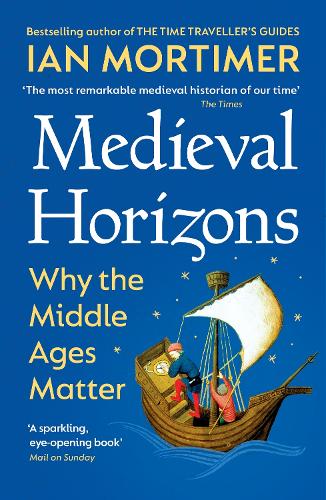
Medieval Horizons: Why the Middle Ages Matter
(Paperback)
Publishing Details
Medieval Horizons: Why the Middle Ages Matter
By (Author) Ian Mortimer
Vintage Publishing
Vintage
11th June 2024
22nd February 2024
United Kingdom
Classifications
General
Non Fiction
Social and cultural history
Historiography
942.03
Physical Properties
Paperback
256
Width 129mm, Height 198mm, Spine 16mm
196g
Description
An essential short introduction to the Middle Ages - and the companion volume to Ian Mortimer's bestselling The Time Traveller's Guide to Medieval England. We tend to think about the Middle Ages as a dark, backward and unchanging time characterised by violence, ignorance and superstition. By contrast we believe progress is the consequence of science and technological innovation, and that it was the inventions of recent centuries which created the modern world. We couldn't be more wrong. As Ian Mortimer shows in this fascinating introduction to the Middle Ages, people's horizons - their knowledge, experience and understanding of the world - expanded dramatically. All aspects of life were utterly transformed between 1000 and 1600, marking the transition from a warrior-led society to that of Shakespeare. Just as Ian Mortimer's bestselling Time Traveller's Guide to Medieval England revealed what it was like to live in the fourteenth century, Medieval Horizons provides the perfect primer to the period as a whole. It outlines the enormous cultural changes that took place - from literacy to living standards, inequality and even the developing sense of self - thereby correcting misconceptions and presenting the period as a revolutionary era, of fundamental importance in the development of the Western world.
Reviews
A sparkling re-evalutation of the Middle Ages ... An eye-opening book that challenges our preconceptions and prejudices about the pastMail on Sunday
Ian Mortimer is a wonderfully readable writerDaily Mail
Medieval Horizons doesn't set out to be a comprehensive survey of medieval England, but rather challenges us to rethink the Middle Ages and its social, cultural and intellectual innovations. Mortimer is a compelling advocate for our medieval inheritance. He is right that we should be proud of it The Times
In this razor-sharp book, Mortimer argues the case for the wonder of the Middle Ages with rigour, verve and, above all, evidenceSpectator
[A] spirited defence of the era ... Compelling stuff from one of the leading experts on the subjectsHistory Revealed
The word 'medieval' has become synonymous with 'backwards, ignorant, violent and superstitious.' But here Mortimer reminds us that our modern world is not the result of the technological developments of the past few centuries. Instead, our cultural, personal, social and environmental identities were forged in the medieval period. By shedding light on the important developments made from the first millennium to 1600, Mortimer asks us to redraw our understanding of the pastJanina Ramirez, Sunday Times-bestselling author of Femina
Provocative and refreshing. Medieval Horizons overturns many myths about the Middle Ages, showing that far from an era of stagnation, it was a period of profound change which has shaped today's worldSeb Falk, author of The Light Ages
Superb ... Mortimer allows us to make wonderfully compelling connections with our forebearsGuardian on The Time Traveller's Guide to Medieval England
His aim, triumphantly achieved, is to engage our sympathies with people whose similarities to us are as fascinating as their differencesSunday Telegraph on The Time Traveller's Guide to Medieval England
Perhaps the most enjoyable history book I've read all yearIndependent on The Time Traveller's Guide to Medieval England
The endlessly inventive Ian Mortimer is the most remarkable medieval historian of our timeThe Times on The Time Traveller's Guide to Medieval England
FascinatingTimes Literary Supplement
Author Bio
Dr Ian Mortimer is the Sunday Times-bestselling author of the Time Traveller's Guides to Medieval England, Elizabethan England, Restoration Britain and Regency Britain, as well as four critically acclaimed medieval biographies. He was elected a Fellow of the Royal Historical Society in 1998. His work on the social history of medicine won the Alexander Prize in 2004 and was published by the Royal Historical Society in 2009. He lives with his wife and three children in Moretonhampstead, on the edge of Dartmoor.
